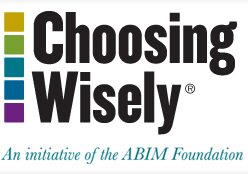Five new recommendations published by the American Board of Internal Medicine Foundation’s Choosing Wisely initiative.

The ASCLS Choosing Wisely Committee announced that the following recommendations were posted to the Choosing Wisely site:
- Avoid routine prothrombin time (PT) and partial thromboplastin time (PTT, APTT) pre-operative screens on asymptomatic patients, use instead a history-based bleeding assessment test.
- Do not order a homocysteine assay as part of the thrombophilia work up.
- Do not order a protein S activity assay for measuring protein S function. Instead, order free protein S antigen.
- Do not use viscoelastic testing to determine blood product transfusions in trauma patient resuscitation without an established, institutional treatment algorithm in place.
- Do not use serum cortisol levels as initial screening for adrenal hyperfunction [Cushing syndrome], instead consider superior strategies provided in the justification.
These recommendations, amplified with clarifying discussions and references, appear on the Choosing Wisely web site, along with the first five ASCLS recommendations published in June 2020.
“Choosing Wisely, ASCLS, and ASCP collaboration has been a partnership that has allowed laboratory professionals to share their expertise with practitioners regarding appropriate utilization and interpretation of diagnostic laboratory test,” said Muneeza Esani, PhD, MPH, MT(ASCP), chair of the ASCLS Choosing Wisely Committee. “As laboratory professionals, this important effort allows us to directly contribute to patient care.”
Hannah Baker, MLS(ASCP)CM, author of Recommendation 10 agreed. “The treatment and diagnosis of patients is highly influenced by the quality of the laboratory test that is used,” she said. “Choosing the correct testing method will allow for high diagnostic accuracy and sensitivity, reducing the patient’s time from symptom onset to diagnosis and treatment.”
Founded as a task force in 2017, the ASCLS Choosing Wisely Committee develops Choosing Wisely recommendations in consultation with the ASCLS Scientific Assemblies and Board of Directors.
“The clinical laboratory test menu has exploded in the past few years, which makes it extremely difficult for clinicians to order the right tests,” said Mayukh Sarkar, PhD, MLS(ASCP)CM, author of Recommendations Seven and Eight. “The Choosing Wisely initiative is designed to promote laboratory tests that are truly necessary that will help physicians reach a faster diagnosis supported by evidence. This initiative is supported by recommendations from ASCLS in collaboration with ASCP, which have been reviewed by peers and then accepted by ABIM.”
The ASCLS Choosing Wisely Committee continues to accept and develop new recommendations from the ASCLS membership. Subject matter experts from the ASCLS Scientific Assemblies review and recommend approval of their respective recommendations, which are subsequently approved by the ASCLS Board of Directors.
“I’m delighted with ASCLS’ contribution to the Choosing Wisely initiative, especially as our Society represents fresh and seasoned laboratory practitioners, plus MLT and MLS educators, the backbone of medical laboratory science,” said George A. Fritsma, MS, MLS(ASCP)CM, ASCLS Choosing Wisely Committee past chair and author of Recommendation Six. “I’m grateful to the late Cindy Johns, who collaborated with me at the 2017 Clinical Laboratory Educators Conference (CLEC) in Boston as we kicked off our task force. Too young, Cindy died Christmas Eve, 2017, but she lives on in our recommendations, especially as we counsel practitioners to avoid ordering PTs and PTTs without indications. Cindy and I would discuss the issue of assay sensitivity in an unselected population when false positives unnecessarily delay critical procedures and raise personal alarm. We welcome all medical practitioners to observe our ASCLS Choosing Wisely recommendations.”
Ryan Mize, DCLS, MHA, MLS(ASCP)CMMB, author of Recommendation Nine, said, “The Choosing Wisely initiative has been a wonderful venue for clinical laboratory experts to offer guidance on proper test utilization. The collaboration between ASCLS and ASCP supports the transition of laboratorians from a ‘behind-the-scenes’ ancillary resource to an active one. Our recommendations contribute to improved patient outcomes through faster diagnosis and treatment times.”
The American Society for Clinical Laboratory Science (ASCLS) and its 9,000 clinical laboratory professional, student, and educator members in more than 50 state and regional constituent societies work to advance the expertise of clinical laboratory professionals who, as integral members of interprofessional healthcare teams, deliver quality, consumer-focused, outcomes-oriented clinical laboratory services through all phases of the testing process to prevent, diagnose, monitor, and treat disease. The Society promotes high standards of practice by holding the profession accountable to a Code of Ethics, through dissemination of knowledge at educational programs, and through publications; maintains a supportive community to advocate on behalf of current and future laboratory professionals; and provides laboratory professionals a voice to legislators and regulators through collective, grassroots efforts.
Choosing Wisely promotes conversations between clinicians and patients by helping patients choose care that is supported by evidence, does not duplicate tests or procedures, is free from harm, and is truly necessary. Beginning in 2012, national organizations representing medical specialists have asked their members to identify tests or procedures commonly used in their field whose necessity should be questioned and discussed. This call to action has resulted in specialty-specific lists of “Things Providers and Patients Should Question.”